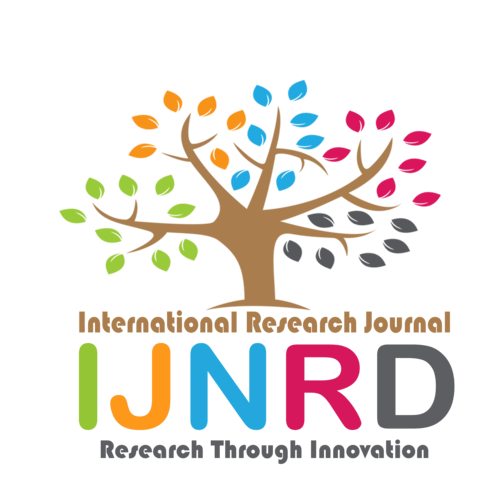|
|||||||||||||||

|
INTERNATIONAL JOURNAL OF NOVEL RESEARCH AND DEVELOPMENT International Peer Reviewed & Refereed Journals, Open Access Journal ISSN Approved Journal No: 2456-4184 | Impact factor: 8.76 | ESTD Year: 2016 Scholarly open access journals, Peer-reviewed, and Refereed Journals, Impact factor 8.76 (Calculate by google scholar and Semantic Scholar | AI-Powered Research Tool) , Multidisciplinary, Monthly, Indexing in all major database & Metadata, Citation Generator, Digital Object Identifier(DOI) |
||||||||||||||
Issue: April 2024
Volume 9 | Issue 4
Review Result and Publication of Paper within : 2-3 days
Click Here For more DetailsFor Authors
Forms / Download
Published Issue Details
Editorial Board
Other IMP Links
Facts & Figure
Impact Factor : 8.76
Issue per Year : 12
Volume Published : 9
Issue Published : 95
Article Submitted :
Article Published :
Total Authors :
Total Reviewer :
Total Countries :
Indexing Partner
Join RMS/Earn 300
Licence
This work is licensed under a Creative Commons Attribution-NonCommercial 4.0 International License







|
Published Paper Details
|
|
| Paper Title: | Deep Learning Based - Breast Cancer Prediction using CNN |
| Authors Name: | Dharshini V |
| Download E-Certificate: | Download |
| Author Reg. ID: |
IJNRD_197990
|
| Published Paper Id: | IJNRD2306002 |
| Published In: | Volume 8 Issue 6, June-2023 |
| DOI: | |
| Abstract: | Breast cancer is a critical global health issue, necessitating early and accurate detection for optimal patient outcomes. Convolutional Neural Networks (CNNs), a branch of deep learning, have demonstrated remarkable success in image classification tasks. This research paper introduces a deep learning-based approach for accurately classifying breast cancer using histopathological images. The proposed methodology combines CNNs with data augmentation techniques and transfer learning to enhance the classification model's accuracy and robustness. The study employs a dataset of histopathological breast cancer images, encompassing both benign and malignant tumor samples. Image preprocessing involves resizing the images to a standard size and normalizing pixel values. Data augmentation techniques, including rescaling, shear range, zoom range, and horizontal flip, are applied to augment the dataset and improve the model's ability to generalize. A pre-trained CNN model serves as the foundational architecture for the breast cancer classification model. Fine-tuning is performed using the breast cancer dataset, customizing the model specifically for the breast cancer classification task. The model comprises convolutional layers for feature extraction, max-pooling layers for spatial downsampling, and dense layers for classification. Training is accomplished using the categorical cross-entropy loss function and optimized with the Adam optimizer. The model's performance is evaluated on a separate testing set. During training, the augmented training data is employed to enhance the model's generalization capabilities. Evaluation metrics, such as accuracy and loss, are monitored to assess the model's performance and guide the training process. The trained model is then saved for future use. Experimental results substantiate the effectiveness of the proposed deep learning-based approach for breast cancer classification. The model achieves a high accuracy rate on the testing set, highlighting its capability to accurately distinguish between benign and malignant tumors. Incorporating data augmentation techniques significantly improves the model's generalization abilities and capacity to handle variations in input data. The findings underscore the potential of CNNs in analyzing histopathological images for breast cancer classification. By leveraging pre-trained models and transfer learning, the proposed methodology enables efficient training and improved model performance. Furthermore, data augmentation techniques contribute to a more diverse and representative dataset, augmenting the model's ability to generalize. This research contributes to the ongoing development of automated breast cancer diagnosis systems, alleviating the workload of medical professionals and enabling early detection for improved patient outcomes. In conclusion, this research paper introduces a deep learning-based approach utilizing CNNs for breast cancer classification. Experimental results demonstrate the efficacy of the proposed model in accurately classifying benign and malignant tumors. By incorporating pre-trained models, transfer learning, and data augmentation techniques, the model's performance and generalization capabilities are enhanced. This research contributes to the advancement of automated breast cancer diagnosis and holds great potential for benefiting patients and medical professionals alike. |
| Keywords: | |
| Cite Article: | "Deep Learning Based - Breast Cancer Prediction using CNN", International Journal of Novel Research and Development (www.ijnrd.org), ISSN:2456-4184, Vol.8, Issue 6, page no.a6-a17, June-2023, Available :http://www.ijnrd.org/papers/IJNRD2306002.pdf |
| Downloads: | 000118757 |
| ISSN: |
2456-4184 | IMPACT FACTOR: 8.76 Calculated By Google Scholar| ESTD YEAR: 2016 An International Scholarly Open Access Journal, Peer-Reviewed, Refereed Journal Impact Factor 8.76 Calculate by Google Scholar and Semantic Scholar | AI-Powered Research Tool, Multidisciplinary, Monthly, Multilanguage Journal Indexing in All Major Database & Metadata, Citation Generator |
| Publication Details: |
Published Paper ID:IJNRD2306002 Registration ID: 197990 Published In: Volume 8 Issue 6, June-2023 DOI (Digital Object Identifier): Page No: a6-a17 Country: Chennai, Tamil Nadu, India Research Area: Engineering Publisher : IJ Publication Published Paper URL : https://www.ijnrd.org/viewpaperforall?paper=IJNRD2306002 Published Paper PDF: https://www.ijnrd.org/papers/IJNRD2306002 |
| Share Article: | |
|
Click Here to Download This Article |
|
| Article Preview | |
|
|
|
Major Indexing from www.ijnrd.org
| Semantic Scholar | Microsaoft Academic | ORCID | Zenodo |
| Google Scholar | ResearcherID Thomson Reuters | Mendeley : reference manager | Academia.edu |
| arXiv.org : cornell university library | Research Gate | CiteSeerX | PUBLON |
| DRJI | SSRN | Scribd | DocStoc |
ISSN Details
 |
 |
ISSN: 2456-4184
Impact Factor: 8.76 and ISSN APPROVED
Journal Starting Year (ESTD) : 2016
DOI (A digital object identifier)
Conference
Open Access License Policy
Important Details
Social Media
| Copyright © 2024 - All Rights Reserved - IJNRD |












Facebook Twitter Instagram LinkedIn